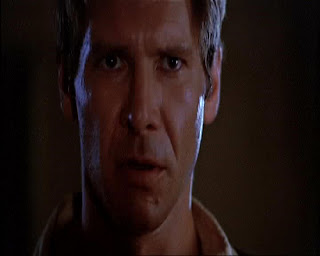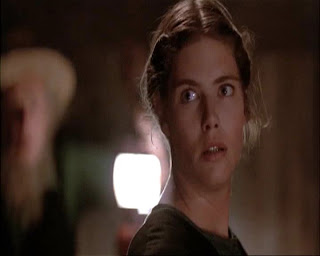Directed by: Peter Weir
Written by: William Kelley (story) (screenplay), Earl W. Wallace (story) (screenplay), Pamela Wallace (story)
Starring: Harrison Ford, Kelly McGillis, Josef Sommer, Lukas Haas, Jan Rubes, Danny Glover, Viggo Mortensen
I daresay that I would have enjoyed Witness (1985) even more had it remained a conventional mystery thriller. This, perhaps, reflects rather negatively on my film-buff credentials, but the film's opening act mounted the tension so brilliantly that it was a pity to see that suspense slowly dissipate into the background. Such an appeal, however, seems quite groundless where director Peter Weir is concerned; given my previous experience with his work, both in Australian cinema (the classic war picture, Gallipoli (1981)) and following his move to Hollywood (the uplifting Dead Poet's Society (1989)), Weir has always favoured emotion and human interaction over the raw thrill of adrenalin-charged action. Even as it stands, Witness deserves to be celebrated for its strong performances, sensitive screenplay and thoughtful exploration of the contrast between the pacifism of the Amish people and the violence and corruption of 1980s mainstream America. The film was Weir's first in Hollywood, after achieving great success with the Australian productions Gallipoli and The Year of Living Dangerously (1982).
 Following the death of her husband, a grieving Amish woman, Rachel Lapp (Kelly McGillis), takes her young son Samuel (Lukas Haas) into the city. It is Samuel's first major venture into the lifestyle shunned by his people, and he is initially awed and excited by all the fresh sights and sounds presented to him. But it doesn't take long for the reality of modern society, corrupted and poisoned by the stench of greed and violence, to rear it's ugly head – in the bathroom of a railway station, Samuel witnesses the brutal murder of a city detective, and only he can identify the men responsible. A weary cop, Det. Capt. John Book (Harrison Ford), employs the young boy's help in solving the case, and, when Samuel positively identifies a respected narcotics detective from his own department, Book begins to understand that they've stumbled into something far deeper than anybody could ever have anticipated. Now with a price on his head, Book falls into hiding with the reluctant Amish community, and both parties come to learn a thing or two about the conflicting values of their respective worlds.
Following the death of her husband, a grieving Amish woman, Rachel Lapp (Kelly McGillis), takes her young son Samuel (Lukas Haas) into the city. It is Samuel's first major venture into the lifestyle shunned by his people, and he is initially awed and excited by all the fresh sights and sounds presented to him. But it doesn't take long for the reality of modern society, corrupted and poisoned by the stench of greed and violence, to rear it's ugly head – in the bathroom of a railway station, Samuel witnesses the brutal murder of a city detective, and only he can identify the men responsible. A weary cop, Det. Capt. John Book (Harrison Ford), employs the young boy's help in solving the case, and, when Samuel positively identifies a respected narcotics detective from his own department, Book begins to understand that they've stumbled into something far deeper than anybody could ever have anticipated. Now with a price on his head, Book falls into hiding with the reluctant Amish community, and both parties come to learn a thing or two about the conflicting values of their respective worlds. Harrison Ford has rarely given a better performance. He's not an actor whom one would typically associate with having a lot of emotional range, but John Book is an intriguingly-subtle character. Note, most particularly, the scene in which Book and Rachel dance in the barn to Sam Cooke's "Wonderful World" – throughout the entire sequence, Book is continually pausing, contemplating the physical contact that is seemingly obligatory in cinematic moments such as these, and consistently deciding against it. Kelly McGillis is remarkably beautiful as the emotionally-conflicted widow, all the more because her character actively attempts to repress any lingering streaks of eroticism (and also thanks to her Amish attire, which fortunately denied her one of those horrifically-dated 1980s hairstyles – see Top Gun (1987)). A crucial benefit of the film's sobering middle act, supplemented by the soft, graceful cinematography of John Seale, is that the audience gradually loses his desensitisation towards violence on film, and so the story's brutal climax is a completely jarring shock to the nerves.
Harrison Ford has rarely given a better performance. He's not an actor whom one would typically associate with having a lot of emotional range, but John Book is an intriguingly-subtle character. Note, most particularly, the scene in which Book and Rachel dance in the barn to Sam Cooke's "Wonderful World" – throughout the entire sequence, Book is continually pausing, contemplating the physical contact that is seemingly obligatory in cinematic moments such as these, and consistently deciding against it. Kelly McGillis is remarkably beautiful as the emotionally-conflicted widow, all the more because her character actively attempts to repress any lingering streaks of eroticism (and also thanks to her Amish attire, which fortunately denied her one of those horrifically-dated 1980s hairstyles – see Top Gun (1987)). A crucial benefit of the film's sobering middle act, supplemented by the soft, graceful cinematography of John Seale, is that the audience gradually loses his desensitisation towards violence on film, and so the story's brutal climax is a completely jarring shock to the nerves.7/10
Currently my #5 film of 1985:
1) Idi i smotri {Come and See} (Elem Klimov)
2) Brazil (Terry Gilliam)
3) The Purple Rose of Cairo (Woody Allen)
4) Back To The Future (Robert Zemeckis)
5) Witness (Peter Weir)
 Currently my #2 film from director Peter Weir:
Currently my #2 film from director Peter Weir:1) Gallipoli (1981)
2) Witness (1985)
3) Dead Poet’s Society (1989)
4) The Truman Show (1998)
5) Master and Commander: The Far Side of the World (2003)
2) Witness (1985)
3) Dead Poet’s Society (1989)
4) The Truman Show (1998)
5) Master and Commander: The Far Side of the World (2003)
58th Academy Awards, 1986:
* Best Film Editing - Thom Noble (win)
* Best Writing, Screenplay Written Directly for the Screen - Earl W. Wallace (screenplay/story), William Kelley (screenplay/story), Pamela Wallace (story) (win)
* Best Picture - Edward S. Feldman (nomination)
* Best Director - Peter Weir (nomination)
* Best Actor in a Leading Role - Harrison Ford (nomination)
* Best Art Direction-Set Decoration - Stan Jolley, John H. Anderson (nomination)
* Best Cinematography - John Seale (nomination)
* Best Music, Original Score - Maurice Jarre (nomination)
 What others have said:
What others have said:"Up until the return to Pennsylvania, Witness has been a slick, superior thriller. Now it turns into an intelligent and perceptive love story. It's not one of those romances where the man and woman fall into each other's arms because their hormones are programmed that way. It's about two independent, complicated people who begin to love each other because they have shared danger, they work well together, they respect each other - and because their physical attraction for each other is so strong it almost becomes another character in the movie."
Roger Ebert, February 8, 1985
"My favourite Peter Weir film, Witness is something special and to simply call it a thriller sells it short. It's a character based drama, a fish-out-of-water story, a story about good versus evil and a beguiling romance between a city cop and a conservative Amish widow. Three years after Blade Runner, Harrison Ford is at his best, while Kelly McGillis in her second film role, exudes a Grace Kelly-like serenity... The contrast between the tranquil world of the Amish community and the brutality is beautifully described and as Ford's John Book finds himself out of his comfort zone, the full effect of the film's charms begin."
Louise Keller, Urban Cinefile, 2007
"Witness records an unexpected gathering of talent meeting at a notable moment in their careers; because of the fortuitous timing, the 1985 film feels like a time capsule from an earlier age. An unforced look at the Amish community contributes to the novelty and timeless quality of Witness, which—though ostensibly a crime thriller—plays more like a Western in its film-shorthand simplicity and inevitability of plotting... Ford's characters have often displayed a capacity for ferocity, inflamed by loving protectiveness. Book sets this standard, and humanizes the conflict of peace versus the arguable necessity of violence."
Peter Canavese






_poster.jpg)


No comments:
Post a Comment